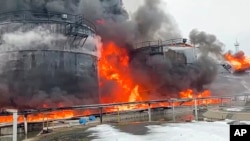A massive fire is burning at an oil storage depot in Russia's western Bryansk region after a Ukraine drone attack Friday. It’s the latest strike indicating that Ukrainian forces are targeting deeper into Russian territory since the beginning of the war almost two years ago.
Four oil reservoirs with a total capacity of 6,000 cubic meters (1.6 million gallons) were burning, sending thick plumes up in the air in Klintsy, a city of some 70,000 people located about 60 kilometers (40 miles) from the Ukrainian border, according to Bryansk regional Governor Alexander Bogomaz, Russian state news agency Tass reported.
Bogomaz said that the depot caught fire when fragments of the drone downed by the military hit the facility.
"An airplane-style drone was brought down by the defense ministry using radio-electronic means. When the aerial target was destroyed, its munitions were dropped on the territory of the Klintsy oil depot," Bogomaz wrote on the Telegram messaging app.
He said air defense units had downed two other Ukrainian drones Friday, over other parts of Bryansk, a region that borders Ukraine.
He said that no one was hurt in the attack.
Reuters news agency reported the information but said it could not independently verify the statements.
Ukrainian drones also targeted the city of St. Petersburg overnight, Ukraine Minister of Strategic Industries Oleksandr Kamyshin told a panel at the World Economic Forum (WEF) in Switzerland Friday, Interfax news agency reported.
St. Petersburg, Russia’s second-largest city, is about 900 kilometers (560 miles) north of the border with Ukraine.
Threatened by a spate of Ukrainian drone strikes, the Russian city of Belgorod, also near the Ukrainian border, canceled its traditional Orthodox Epiphany festivities Friday. It was the first time major public events were known to have been called off in Russia due to the drone threat.
Ukrainian national media, quoting an official in Ukraine’s intelligence service, said Ukrainian drones on Friday also attacked a gunpowder mill in Tambov, about 600 kilometers (370 miles) south of Moscow.
But Tambov Gov. Maxim Yegorov said the plant was working normally, according to Russia’s RBC news outlet. The Mash news outlet had earlier reported that a Ukrainian drone fell on the plant Thursday but caused no damage.
Both Russia and Ukraine are attacking each other’s energy infrastructure in the middle of winter to demoralize each other.
Ukraine’s attacks inside Russia also aim to unsettle daily life there and to undermining President Vladimir Putin’s rubber-stamp presidential election in March.
Ukrainian President Volodymyr Zelenskyy has vowed to hit more targets deeper inside Russia this year, while Russia’s air defenses are focusing on occupied regions of Ukraine, Kyiv officials say, leaving more distant targets inside Russia more vulnerable to Ukraine’s longer-range drones.
In his nightly video address Friday, Zelenskyy said, “The world has the strength to defend normal life” in this time of uncertainty as wars threaten humanity. "The world has this strength. And this strength must work now to stop Russia.”
“I am grateful to everyone who helps. Grateful to everyone who defends Ukraine, who works for Ukraine, who remembers that the major challenge is to give our country every opportunity to drive out the occupiers. We will definitely do this,” Zelenskyy said.
Meanwhile, Russian shelling in Ukraine’s northeastern Kharkiv region killed a 57-year-old woman, and a land mine there killed a man, the Ukrainian president’s office reported Friday.
Macron urges 'war economy mode'
French President Emmanuel Macron urged defense manufacturers Friday to increase production to respond more quickly to Ukraine’s needs in its defensive war against Russia.
Pushing for the defense industry to switch to a “war economy mode,” Macron stressed during his visit to the Cherbourg naval base in northwestern France “we can’t let Russia think that they can win,” and he warned that “a Russian victory would mean the end of European security.”
Ukraine warned Thursday that its army faced a “very real and pressing ammunition shortage.
European Commission President Ursula von der Leyen echoed Macron’s warnings. During the talks at the WEF in Davos she urged Kyiv's Western allies to continue arms deliveries and financial support. “Ukraine can prevail in this war but we must continue to empower their resistance,” she said.
The European Union had promised to deliver 1 million shells by early 2024 but European Parliament lawmakers said only 300,000 have been delivered so far.
Black Sea grain deal
The Kremlin said Friday that there was no prospect of reviving the U.N.-brokered Black Sea grain deal and that alternative routes for shipping Ukrainian grain carried huge risks.
The original deal, which facilitated safe grain exports from Ukraine through the Black Sea, expired last year after Moscow refused to renew it, saying its own interests had been ignored.
The European Union has started discussions on a new sanctions package for Russia that could be approved by Feb. 24, Bloomberg News reported Friday.
The potential measures could include further listings, more trade restrictions and cracking down on Moscow's continued ability to get around the bloc's sanctions both through third countries and companies within the EU, the report said, citing people familiar with the matter.
Some information for this report came from The Associated Press, Agence France-Presse and Reuters.





